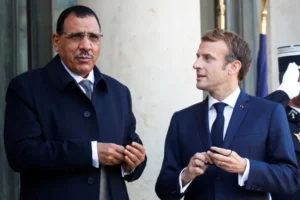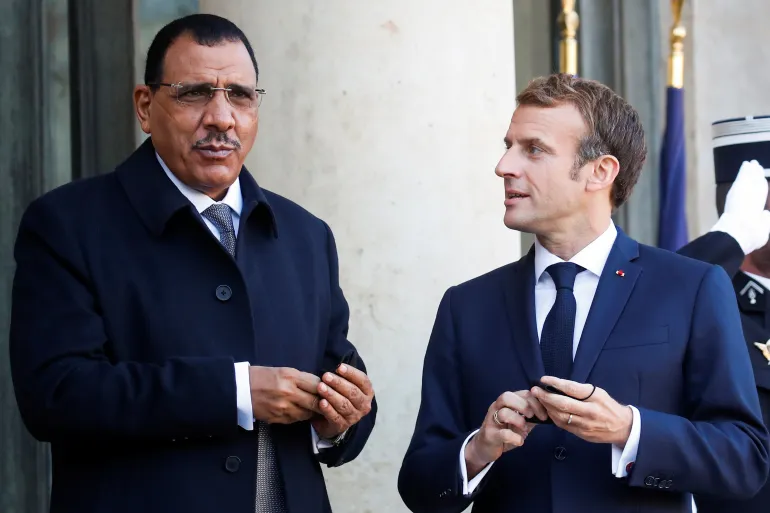
After the Niger coup… What are France’s options for its military stronghold in Africa?
Paris – “Down with France and imperialism, long live Russia.” A message was written in large letters in front of the French embassy in the Nigerien capital, Niamey, last Sunday, 4 days after the coup led by General Omar Abdel Rahman Tianyi against the country’s president, Mohamed Bazoum.
This message reflects the difficult times that France’s influence in Africa is going through, despite French President Emmanuel Macron’s 18th African tour in 6 years last March, with the aim of bridging the gaps created by anti-French sentiment and returning his country to co-opt the Africans.
It seems that France’s last stronghold is under real threat, and questions revolve around it about the future of French concessions in the Sahel region after the fall of its ally, Bazoum.
In this particular situation, Jean-Pierre Perrin, renowned as both a writer and a political analyst, openly shared his lack of surprise at the actions undertaken by the demonstrators outside the consulate. He articulated that while the Kremlin’s direct involvement in the coup might be lacking, France continues to be symbolically singled out due to its historical role as a former colonizer. It’s worth highlighting that other influential European Union nations, notably Italy and Germany, also maintain substantial economic interests within the nation in question.
During an insightful conversation with Al-Jazeera Net, Biran drew attention to a significant lapse in intelligence on Paris’ part. The inability to foresee the rise of the coup leaders within a country where certain factions of the French military maintain a presence has raised perturbing academic concerns. This oversight further adds complexity to the already intricate situation prevailing in the Sahel region.
The political analyst pointed out that this failure caused 4 French failures, which began in Burkina Faso, Mali and the Central African Republic, which welcomed Moscow and Wagner, and then finally Niger.
For his part, Benny Jerome, a military analyst and co-founder of the Network for Strategic Thinking on Security in the Sahel, believes that France has lost influence in its former colonies and that relations between Paris and the countries of the region are not ideal, especially with the presence of other powers in the region such as Russia, China, Turkey and others.
Speaking with Al-Jazeera Net, Jerome elaborated on the situation, highlighting that France found itself unable to anticipate the unfolding events. It’s possible that both France and the inner circle around President Bazoum underestimated the gravity of the situation, even though they possessed substantial knowledge about the region. However, the evolving events surpassed the intelligence capacity of Paris, mainly due to the increasing complexity of coastal dynamics.
In Jerome’s analysis, “While cooperating with the ruling administration had its merits in terms of stability and safeguarding vital interests, it ultimately fell short. Nonetheless, Paris will likely reiterate its commitment to supporting an ally, emphasizing that intervening in the internal affairs of this African nation isn’t its role. The reality remains that both its current interests and the broader stability of the region are facing a significant and imminent threat.”
Navigating the internal and continental divides
The intricate state of affairs within Niger, both from a political and military standpoint, drew analysis from Biran, the astute political observer. He attributed the volatility to the prolonged deliberations among the generals and officers regarding the appointment of the current leader of the National Guard. This, in his assessment, served as a clear indicator of a significant internal schism within their ranks.
Perran, delving into the complexities, remarked, “The surface perception of a rebellion takes on nuances distinct from other scenarios, even though the overarching theme involves soldiers vying for control. What is becoming increasingly evident is the gradual intensification of their internal discord. Their divisions extend and become palpable even in their interactions with Paris.”
“It’s crucial to bear in mind that a significant portion of these soldiers underwent education in France, particularly in military academies and war schools. This educational connection fosters a bond that they won’t easily disregard,” he inserted.
On a contrasting note, Jerome underscored the intricate fragility surrounding Bazoum’s government. He illuminated how Bazoum’s position as the apparent successor to former President Mohamed Issoufou might have led him to underestimate the efforts of certain hidden influencers aiming to destabilize his administration. This underscores his lack of complete autonomy, given that the support network of the previous president remains entrenched within the system, often through familial ties. Recent reports indicate the detention of another notable individual earlier this week, and intriguingly, Bazoum’s Chief of Staff maintains a close affiliation with President Issoufou, adding a layer of complexity.
Change strategies:
In the context of strong destabilization, the possibility of the withdrawal of French military forces from Niger will bring an era to a close, after France portrayed itself as the anti-jihadist policeman in the Sahel region, which makes the necessity to change its current strategy inevitable.
Jerome believes that France “must redefine its security and military strategy in Niger, that is, after the Barkhane and Takuba operations, and bear its share of responsibility due to its poor communication and inability to be firm enough to guarantee what is called after-sales service.”
He highlighted the necessity for Paris to envision a fresh approach, characterized by a unique blend of French-African dynamics. “In light of the substantial investments pouring in from the European Union, encompassing billions of euros channeled towards collaborative ventures spanning infrastructure, development initiatives, and financial support,” he underlined, “it’s imperative that we reassess the landscape of the North-South cooperation paradigm.”

